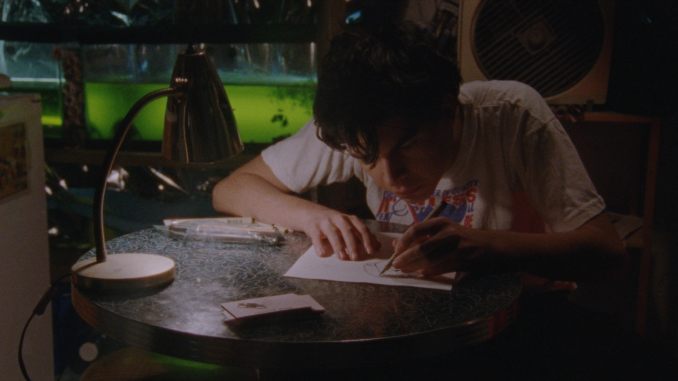From the Funny Page to the Screen: Owen Kline on Turning His 2-Page Comic into His Feature Film Debut

Nearly twenty years after his starring role in Noah Baumbach’s The Squid and the Whale, Owen Kline makes his feature film debut behind the camera with Funny Pages, as writer, director, and editor.
In the dark A24 comedy, Daniel Zolghadri plays Robert, an aspiring cartoonist who, against his parents’ wishes, drops out of high school. With a one-track mind of wanting to be an artist, he brings chaos into his life, inadvertently pushing away his family and friends in favor of connecting with Wallace (Matthew Maher), a volatile former assistant color separator who worked at a major comic book publishing company.
Kline hadn’t set out to be an actor like his parents Phoebe Cates and Kevin Kline. He knew early on he wanted to work behind the scenes instead. But when he read for the role as Frank in Baumbach’s film fresh into his teens, he caught the attention of the famed filmmaker. “I wasn’t hesitant to [act] but I really wanted to be a filmmaker then,” explains Kline, from his apartment in Queens. “The reason I [decided to star in the film] was mainly because I loved Bob Yeoman’s work, who shot it.” Young Kline was in awe of Yeoman’s work as a cinematographer on set, seeing him as “another actor in the scene” because of how artfully his camera work added depth to the shots by shooting it hand-held—a shooting style he took on for his own film.
Kline doesn’t deem Funny Pages to be as autobiographical as The Squid and the Whale was for Baumbach, but it’s a story that’s closely tied to himself. “When I was a kid, all I really wanted to do was write comedy and create a cartoon character—or create a character in a newspaper,” says Kline. He wasn’t interested in superhero comics like other kids (“They just seem like they were made by anyone”), instead feeling more inspired by the funny page in the newspaper, admiring cartoonists like Peanuts creator Charles M. Schulz and Mort Walker, the artist behind the Beetle Bailey strips.
Though Kline doesn’t consider himself to be a professional cartoonist, it’s a passion that’s carried on since then. In 2011, he made a comic book zine, Whippers & Snappers, that featured a two-page strip called “Robert in the Boiler Room.”
“Starting with a comic was helpful because it’s like taking a scene and translating [it into a different medium], which is more behavioral and visual,” he explains.
-

-

-

-

-

-

-

-

-

-

-

-

-

-

-

-

-

-

-

-

-

-

-

-

-

-

-

-

-

-

-

-

-

-

-

-

-

-

-

-








































